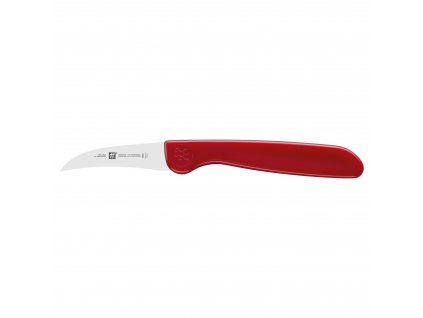Peeling knives
Product sorting
1 items total
List of products
Listing controls
1 items total
Peeling Knives – your small handy helpers
What use does the peeling knife serve?
Peelers do just what their name suggests: they take the skin or peel off fruits and vegetables. They feature a short, inflexible, slightly curved blade with the edge on the inside of the curve
What makes a good peeling knife?
- The majority of peeling knives are mostly used for peeling fruit and vegetables, hence they need to be pretty sharp.
- To prevent slipping and cutting your hand, the handle should be ergonomic and the choice of the best material should be carefully considered so as to ensure control over the knife while using it.
- A material made of carbon steel or something comparable is the ideal material used, since it holds the edge well, is simple to sharpen with a wet stone, and is simple to hone with a steel rod.
What is the difference between paring knives and peeling knives?
Although both knives are small and can be of great use when dealing with vegetables there are some differences between the two types of knives:
- Peeling knives often have a blade length of 5 to 10 centimetres, whereas paring knives typically have a blade length of 7,5 to 12,5 centimetres.
- Peeling knives have curved, bird-beaked blade edges perfect for creating beautiful garnishes whereas paring knives have straight, double-bevelled edges.
- Peeling knives are mostly used to peel fruits and vegetables, whereas paring knives are also used to core fruit and chop small items.
For better fruit and vegetable preparation, you can also check our vegetable graters, as well as mandoline slicers and peelers.
How to take care of your peeling knife?
Kitchen knives are quite an investment so if you want your peeling knife to last for ages, make sure you follow these simple rules for cleaning and storing your knives:
- knives are often dishwasher-safe but we recommend you clean your knife by hand as dishwasher detergents can damage the surface of a steel blade
- if a knife has a wooden handle, do not put it in the dishwasher
- to prevent wooden handles from becoming dry, regularly oil them with linseed oil or beeswax
- store your knife separately so that the blades do not get dull. Use a knife block or a knife case
- sharpen your knife regularly
.png)
